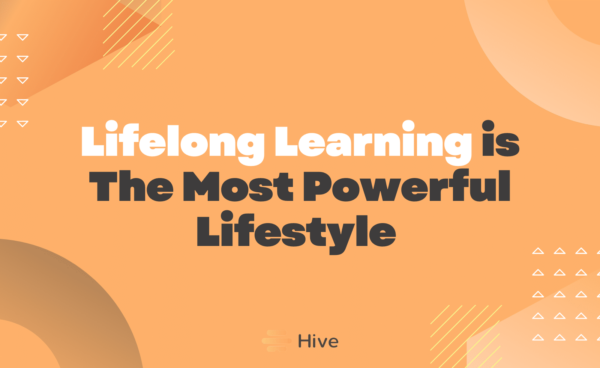The ability to improve what you know consistently is one of the most powerful habits for a better and smarter life. A solid lifelong learning habit changes lives. “Lifelong learning is the “ongoing, voluntary, and self-motivated” pursuit of knowledge for either personal or professional reasons.” It’s crucial for your personal growth.
Isaac Asimov explains it beautifully, “Self-education is, I firmly believe, the only kind of education there is.”
Some of the most successful and smart people are always learning. Leonardo da Vinci, Descartes, Immanuel Kant, Benjamin Franklin, Abraham Lincoln, Steve Jobs and many of history’s great minds were massive lifelong learners — they were curious about many topics.
They made time to explore their intellectual curiosities. “Learn as much as you can from those who know more than you do, who do better than you, who see more clearly than you,” says Dwight D. Eisenhower.
Learning new skills, gaining new knowledge, upgrading your mindset, expanding your perceptions, changing your mind when necessary are essential habits of highly successful people.
If you are not learning something of value most of the time, don’t expect a different or better life. Einstein was right, “Insanity is doing the same thing over and over and expecting different results.” A better life is hidden in the learning habits you are avoiding. Lifelong learning can help you find the routines and behaviors that guarantee real progress.
Life is not linear — the ability to adapt and adjust where necessary is necessary for accelerated growth. Lifelong learning can help us become better at what we do by challenging our minds and skills by learning new topics or exploring different points of view. Learning is an infinite lifelong process — if you make it enjoyable, it won’t become a chore or boring.
It’s not structured learning; it’s a fun way to pursue your intellectual curiosities and upgrade yourself. Learning is not just about acquiring knowledge or skills in school. We learn throughout our lives and constantly develop new habits, beliefs, and abilities that make us who we are. So why not make it deliberate?
You can explore the many ways to learn, whether through online courses, newsletters, podcasts, books, audiobooks or documentaries. For example, if you’re interested in data engineering, online resources like AZ-104 Exam Dumps can help you prepare for the certifications. Make it personal and choose content options you enjoy.
In the age of knowledge abundance, learning should not only be limited to a place and time; we can embrace learning as an ongoing process of becoming better versions of ourselves.Through the experiences of successful and highly efficient people, we can learn what works and what doesn’t and use better skills and knowledge to improve what we know and do.
Unstructured self-directed learning can teach us almost everything we need to know to improve our lives consistently. The application of knowledge is not limited to a place or time. In your daily interactions and experiences, you can maintain an open and curious mind and take complete control of your self-paced learning.
The good news about lifelong learning is that you don’t have to disrupt your current schedule to learn something new every day. You can start with just 5 minutes of learning every day — focus on bite-sized knowledge via reading apps, newsletters, or courses to learn something new. Newsletters and books have worked well for me. I read great essays and marketing posts from experts and thought leaders every week. If you are interested in a specific skill, you sign up for a course or find an expert who teaches it online. Learn from anywhere at any time you want.
It’s entirely up to you to decide your learning pace and the content type that works for you. Make it a fun habit if you are in it for the long haul. Richard Feynman, a famous scientist and physicist once said, “If you’re not having fun, you’re not learning. There’s a pleasure in finding things out.” It’s essential to make it enjoyable or something to look forward to; otherwise, it becomes another boring learning experience.
“Intellectual growth should commence at birth and cease only at death,” Albert Einstein. Formal education only lays the foundation for acquiring knowledge. To renew your mind, upgrade your mindset and improve on what you already know, use informal learning opportunities.
Start with a to-learn list — choose your topics wisely. What’s more important to your success? What skills can make you indispensable in the future? What habits can you learn to improve your odds of success? Find your knowledge sources and set aside time for learning. You can use blogs, books, podcasts, newsletters, and videos to feed your mind daily or weekly. Make reading or listening a learning habit.
Take action on what you learn — apply knowledge to your specific problems and learn from your personal experiences. Ponder over what you are learning by taking breaks — go for a walk, sit to reflect, teach what you know or make personal notes. Life never stops teaching — it’s our responsibility to continue our learning to become better versions of ourselves.
“Knowledge has to be improved, challenged and increased constantly, or it vanishes,” says Peter Drucker. Live as if you have something new to learn, and you will pick knowledge unconsciously.
Live as if a better life depends on lifelong learning because it does.
What you know influences your next action — improve what you know, and your future self will make an intelligent choice for the life you want. Make learning a lifestyle — your long-term health, wealth, and wisdom depend on it.




